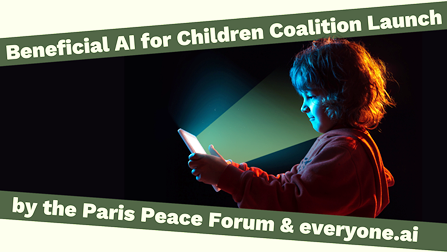At the AI Action Summit in Paris, the Paris Peace Forum announced the creation of a global coalition to ensure AI supports, rather than harms, children’s development. The initiative, co-led with everyone.ai, unites governments, tech companies, educators, and child development experts to establish clear, evidence-based guidelines for AI systems that impact young users.
RELATED: ITU’s AI for Good Global Summit 2025 to tackle the rise of autonomous AI
Artificial intelligence is transforming childhood — offering opportunities for personalized learning, accessibility, and inclusion, but also posing risks, from AI-driven manipulation to disrupted cognitive development. “If we act wisely now, AI can support children’s growth and well-being, rather than undermine it,” warned Justin Vaïsse, Director General of the Paris Peace Forum. “This coalition will put children’s needs at the heart of AI development.”
Creating guidelines for AI products used by children
The coalition, supported by the French Minister of International Partnerships and a number of governments, companies and civil society organizations, is based on our “Call to Action for Beneficial IA for Children”. The grouping aims to create shared guidelines across industry, governments and experts for AI products used by children, push for long-term research on AI’s developmental impact, and promote AI literacy for parents, educators, and policymakers.
Participants in this coalition include major tech companies (Open AI, Google, Anthropic, Hugging Face, PlugnPlay, Vivendi, evidence B), governments (France, Denmark, Norway, Chile, Mexico, Bulgaria, Senegal, Togo, Iceland), and key NGOs and foundations (McGovern Foundation, Common Sense Media, 5Rights, Girl Effect, AI4good, Tralalère, Joan Ganz Cooney Center, Children and Screens, NSPCC, Edtech France, Respect Zone, AI4good, Fondation Enfance, We Protect, The Future Society, ICMEC, e-Enfance, InnovateEDU, Access to Knowledge for Development Center / American University in Cairo). UNICEF and UNESCO are closely associated with its work. The coalition also includes experts such as Stuart Russell, Sonia Livingstone, Luc Julia, Gregory Renard, Mathilde Cerioli, David Harris, Laurence Devillers and Florence Gsell.
Coalition to continue to grow quickly
Discussions are still ongoing with a dozen other key players across industry and governments, and we expect the coalition to continue to grow quickly.
Anne-Sophie Seret, Executive Director of everyone.ai, stressed “To develop AI that is truly beneficial for children we need to work together with all stakeholders: governments, companies, researchers and civil society.”
The coalition launch is part of the Paris Peace Forum’s broader leadership on governance of global public goods like AI. Since 2018, the Forum has helped forge international consensus on a range of issues from cybersecurity to critical minerals. Its AI work began in 2021, focusing on bridging perspectives between the Global South and leading AI economies. In 2024, it played a key role in shaping AI governance deliverables at the AI Action Summit, setting the stage for this year’s breakthroughs.
AI for good and transformative civil society
The Forum’s presence at this year’s AI Action Summit went beyond policy: the Forum showcased 50 cutting-edge AI projects, selected from 770 submissions across 111 countries. From AI-powered tools for the visually impaired to digital violence prevention and labor rights protection, these projects highlight AI’s transformative potential while reinforcing the need for strong governance. Four of those projects were also recognized by the General Secretariat for Investment, an agency reporting directly to the French Prime Minister, as “Covergence AI Challenges” – proving just how transformative civil society and business can be in shaping AI for good.
Building on its work on cybersecurity, and as AI-driven cyber threats move from theory to reality, the Paris Peace Forum additionally launched a new report that proposes a pragmatic methodology to assess whether new governance frameworks are needed or if existing cybersecurity mechanisms can be adapted. It highlights the critical need for transparency, information sharing, and international coordination to mitigate AI’s adversarial use while strengthening cyber defenses.
At the AI Action Summit, the Forum also organized a number of discussions, sessions and side events on AI’s impact in Africa, the rising threat of AI-driven cyber risks, and the challenge of AI-fueled disinformation on the African continent. In the months to come, the Forum will continue to work to develop AI for the common good.

































